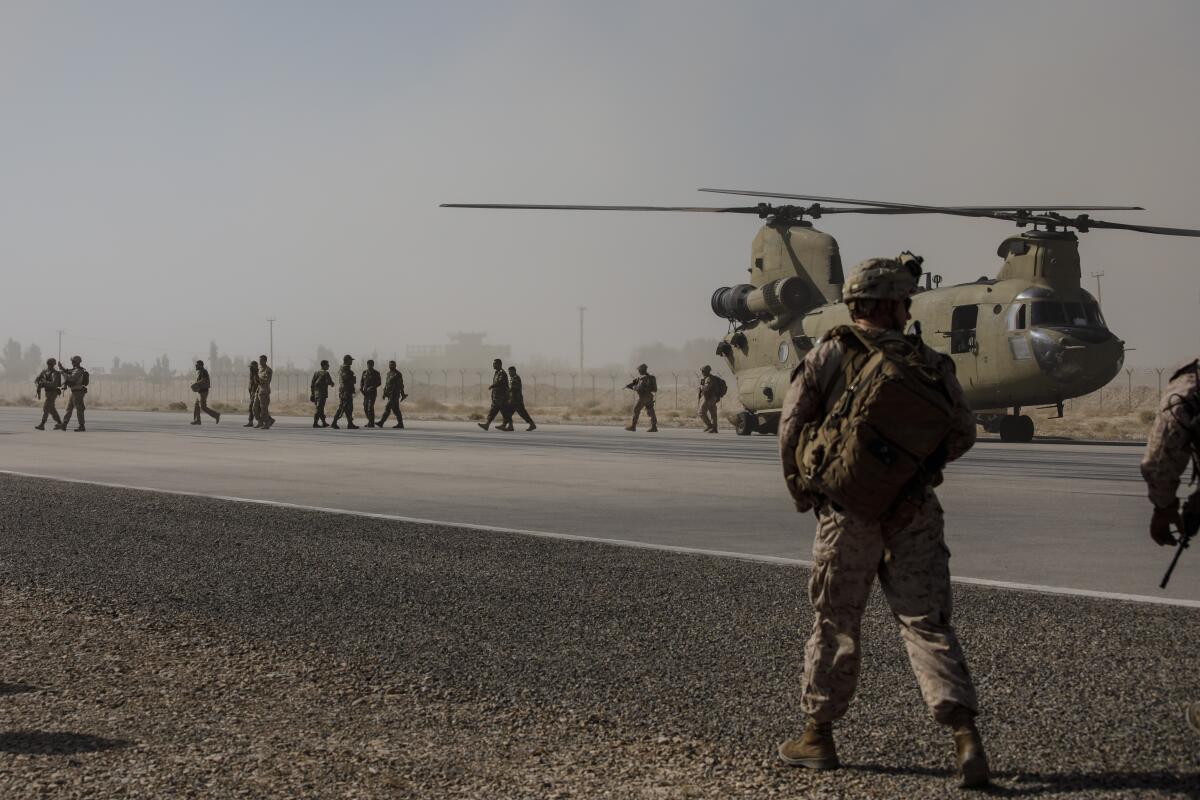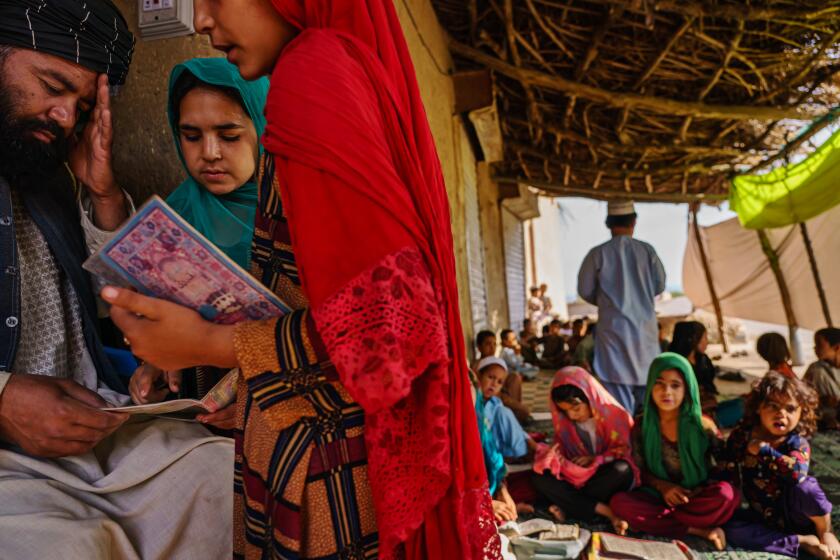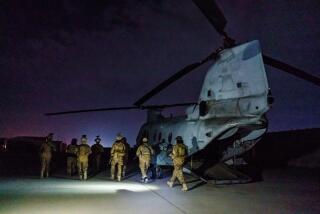Do Biden administration assurances on Afghanistan reflect the reality on the ground?

- Share via
WASHINGTON — The Biden administration’s defense of its final troop withdrawal from Afghanistan is predicated on claims and assumptions that many say are shaky at best. It depends in large part on a conviction that progress made in Afghanistan during the last 20 years — in education, development, human rights — is irreversible. That today’s Afghanistan is a fundamentally changed nation, and that Taliban militants accept the transformation.
But facts on the ground belie many elements of that conviction.
The most important questions
What will prevent Taliban insurgents from attempting to take over Kabul, the capital? What will prevent the group from returning to the egregious abuses it practiced when it ruled Afghanistan in the 1990s, when it forced women out of public view and imposed a harsh and antiquated form of Islam?
The Biden administration insists the Taliban now knows it must behave according to globally accepted norms to enjoy international recognition.
“Any government that comes to power at the barrel of a gun, through force, is not one that will have popular support, it is not one that will accrue assistance from the international community, it is not one that will have international legitimacy,” State Department spokesman Ned Price said this week.
“What we know is that the world will not accept an imposition by force of a government in Afghanistan,” he continued. “The legitimacy of any future Afghan government, the ability of that government to receive international assistance — which will be of critical importance — the durability of any future Afghan government can only be possible if that government has a basic respect for human rights.”
In fact, the Taliban, while perhaps on best behavior now, has shown little regard for international acceptance, experts and diplomats say. It was not concerned with being largely a pariah state for nearly a decade, supported only by neighboring Pakistan, where many share an affinity for equally radical forms of Islam.
And when the Taliban does allow international organizations to work in its territory, providing medical care or food, it is at a high cost: The militants charge the groups tens of thousands of dollars in protection money.
Critics say the U.S. government rhetoric is aimed at saving face even as the administration accepts less than credible Taliban assurances.
“People want to find justifications for abandoning Afghanistan that they know aren’t true,” said David Sedney, until recently president of the American University in Kabul and a former senior Pentagon official who handled the Afghan region. “They’re tired of it, it’s hard.”
Diplomacy vs. warfare
Even as U.S. officials continue to insist that “only a political solution” will resolve the conflict in Afghanistan, the Taliban aggressively pursues a military outcome, one in which it fully intends to be the victor.
“Too painful to see the country we invested our blood and energy gets destroyed in front of our eyes,” Fawzia Koofi, a rare female member of the Afghan government’s peace negotiating team, said on Twitter. She called on the U.S. to “use its leverage,” adding that “way too many people lose life daily” in Afghanistan.
In recent days, Taliban forces have advanced and taken control of one district after another in the Afghan countryside — a third of the more than 400 districts — and this week seized a provincial capital, the first such urban foray. There has been some speculation that the insurgents will surround the cities rather than overrun them as a way to demand further concessions from the Afghan government.
Despite the military campaign, teams of Afghan negotiators representing both the government and the Taliban, with the U.S. playing an observer role, have continued to meet in Doha, Qatar, in what are described as peace negotiations. Yet the Taliban team has yet to make clear its plans and goals, leaving many observers unsure of its ultimate intentions. A proposal for a joint interim government, floated recently by U.S. special envoy Zalmay Khalilzad, sputtered and failed.
Price, of the State Department, cited a statement from the Taliban this week that said it wanted to “accelerate” diplomacy. Asked what that meant, given the reality on the ground, Price declined to say, adding it was up to the Taliban to define terms.
The talks “are designed to handcuff, confuse and provide false hope to the Afghan government and people,” said Bill Roggio, a military expert at the conservative Foundation for Defense of Democracies.
He said the Taliban “has manipulated the entire process from the beginning” with the aim of reestablishing the Islamic Emirate of Afghanistan styled after the iteration dissolved after the U.S.-led invasion in 2001. The U.S. invaded after the Sept. 11 terrorist attacks, claiming the Taliban gave refuge to those who planned the devastating assaults.
As U.S. forces pull out from Afghanistan, the Taliban is in the ascendant — and threatening to retake the city that was its former spiritual capital.
Is it already over?
The speed with which the Taliban is advancing has stunned U.S. officials. U.S. military commanders are now warning of a possible civil war that would bathe the troubled country in new rounds of bloodshed that would reverberate throughout the region. Hundreds of Afghan soldiers have fled the country in the face of the Taliban push.
“If we don’t provide them [Afghan military forces] some support, they certainly will collapse,” U.S. Marine Corps Gen. Kenneth McKenzie, head of U.S. Central Command, testified to a Senate committee in April. “I think everyone is concerned that should ... a civil war ensue, there’s the possibility of mass refugee movement that could affect all forms of the nations around Afghanistan.”
And the stated principal goal of invading Afghanistan in the first place — diminishing the ability of networks such as Al Qaeda to use the country as a launching pad for terrorist attacks — has only partially been achieved, military commanders say. Al Qaeda chief Osama bin Laden was assassinated a decade ago, but ties between the militant network and the Taliban are not completely severed, despite Taliban assurances to the contrary, according to U.S. intelligence and United Nations reports.
McKenzie acknowledged that the withdrawal will leave American forces less able to observe activity by Al Qaeda, Islamic State or other militant groups. Early hopes that the U.S. could set up bases or observation posts in neighboring countries foundered when no nation would allow such a presence. That would place forces on warships in the sea, too far away to be effective in air support or surveillance.
A report last month by a U.N. Security Council monitoring team concluded that the Taliban and Al Qaeda remain “closely aligned” and “show no sign of breaking ties.” (The Taliban disputed the report.)
An Afghan tradition was all but stamped out by religious extremists who — hearing sin instead of song — outlawed music and threatened with death its practitioners.
Has the Taliban changed?
Its leaders insist the Taliban would offer a government for all citizens and treat people fairly. U.S. officials point to the millions of girls who now go to school and women who work and hold government positions as evidence that Afghanistan cannot return to the dark days of Taliban repression of all women.
Many people remain skeptical, however. The Taliban also abused minorities and imposed oppressive social restrictions on all citizens. In recent weeks, there have been bombing attacks on a girls’ school and on the Hazara minority — 100 killed in one attack in May — but the Taliban routinely denies responsibility.
In addition, news reports describe a video that is currently circulating and purports to show the Taliban staging a public flogging of a woman, another familiar practice from the past — coupled with public stonings and executions. Reports also say the Taliban has already begun censoring or banning provincial radio stations, forcing them to increase religious content and eliminate women’s voices. The Times could not confirm the reports.
“The ideological goals of the Taliban in the ‘90s [are] the same as today,” Gina Bennett, an intelligence analyst with the government’s National Counterterrorism Center, said in a panel discussion Thursday. “That’s not going to change.”
Annie Pforzheimer, a veteran U.S. diplomat who was deputy chief of mission in Afghanistan, said the Taliban is already rolling back women’s rights in areas it controls. The only guarantee women and girls will have is if Afghan government forces can retain control over a majority of the population, said Pforzheimer, who also helps lead the Alliance in Support of the Afghan People, which advocates for continued U.S. engagement. Otherwise, “those rights are no longer guaranteed, or are under threat,” she said.
Is there an alternative to U.S. withdrawal?
President Biden says it’s past time to leave. Basic anti-terrorism goals have been achieved and the more elusive objectives remain, well, elusive. The status quo was not an option, he said.
Others suggest the U.S. could have engineered a more orderly withdrawal if it had coordinated better with North Atlantic Treaty Organization allies, who have served alongside the Americans from the start of the invasion in 2001. Several countries would have been willing to keep troops in Afghanistan had they been assured of U.S. air support that would provide the ability to evacuate in emergencies as well as air cover.
But the U.S. drew down so quickly that many NATO commanders say they were left in the lurch.
“Speed is safety,” Biden said Thursday.
The bottom line that Biden is counting on, however, is there is little remaining appetite, political will or public interest in the Afghan project.
Laurel Miller, a former State Department special envoy for Afghanistan now at the International Crisis Group, said in a tweet that the administration views the withdrawal as “closing the books on a failing enterprise.”
Biden, she said, “has been clear that US policy is now premised on a determination that there is no US obligation to Afghanistan.”
More to Read
Get the L.A. Times Politics newsletter
Deeply reported insights into legislation, politics and policy from Sacramento, Washington and beyond. In your inbox three times per week.
You may occasionally receive promotional content from the Los Angeles Times.













